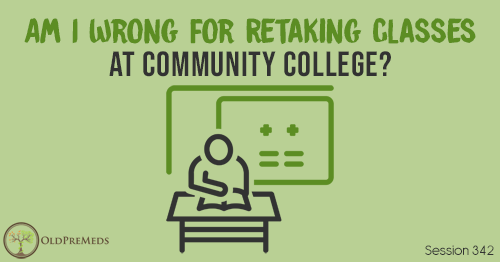Apple Podcasts | Google Podcasts
Session 244
Today’s question is something that confuses a lot of students when they’re applying in-state versus out-of-state. What constitutes strong ties to a public out-of-state school?
Questions answered here on the podcast are taken directly from the Nontrad Premed Forum over at premedforums.com. Please go ahead and register for an account, ask your question, and have fun with the community.
As we’re building up Mappd, this is actually one of the things that we want to include. We do have a med school search. It’s not going to replace the Medical School Admission Requirements (MSAR) obviously.
Also, please be sure to check out all our other podcasts on Meded Media as we try to bring you as many resources as you need on this journey.
Listen to this podcast episode with the player above, or keep reading for the highlights and takeaway points.
[02:45] OldPreMeds Question of the Week
“What’s the best way to narrow down locations on my school list?
I am from Colorado, did my undergraduate and graduate education there, and my whole family still lives there as well. After grad school, I moved to Florida and have been here for the past 3 years doing clinical research. Colorado only has one MD school and Florida has 8 so both states are top of my list due to the ties that I have.
Do medical schools only focus on residency or do they factor in how long you’ve been in that location? Technically I’m still a Colorado resident but I don’t want my chances of Florida schools being affected because of this since I’ve invested so much time in Florida.
Also, Dr. Gray mentions not applying to out of state schools unless you have “strong ties” to that state. How are we able to show these strong ties? Will they see it in my ECs when I list my work in Florida? Will I be able to talk about it during secondaries? Or should I mention it in my personal statement? Please advise!”
[03:39] Question on Residency
How are you still a Colorado resident if you’re living in Florida post-graduation? So I would check that out first to make sure you’re not breaking any laws. Living in Florida as a Colorado resident, my guess is that you should probably be a Florida resident.
So you get the Florida residency and figure all of that out for Florida medical schools because there are so many Florida medical schools.
Also, why just MD schools? You might want to include DO schools in your options as well.
[04:47] What Constitutes Strong Ties
If you’re a Florida resident and you have super strong ties to Colorado. It could be that you did your undergraduate or graduate education in Colorado and your family lives there. Those are really strong ties.
A common question that the admissions committee would ask out-of-state applicants is why their institution, in say, Kentucky?
If you say your uncle lives in Kentucky and you visit there every summer and so on, then that is a strong tie. But when you say that you went to Kentucky for a vacation just one time and you love it there and you want to go back. Then that’s not a strong tie.
So think about it in terms of those types of things. How often do you come to the state? Why do you come to the state? Going to high school is a strong tie for that state or you probably grew up in that area.
“What is it that's drawing you back to the state that will give you strong ties?”Click To Tweet[06:18] Texas Schools
Texas law says less than 10% or 10% max of students for each class can be out-of-state students or non-Texas resident students. And if schools encroach that or they go over whatever, then there are penalties for the school in terms of funding.
The TMDSAS application asks for residency status, but it also asks for high school information. And so they’ll have the data to show what percentage of out-of-state applicants went to high school in Texas. My assumption is It’s going to be a large percentage of students.
Now, I talked to Dr. Scott Wright, who’s the VP of academic advising at Mappd. And he said that the one data point that they could consistently find is that the best predictor for out-of-state applicants to get in is a really strong MCAT score. And that’s something that a lot of schools do, unfortunately.
Again, some questions to ask yourself: Where did you grow up? Do you have family there? Where do you visit every year? Those are strong ties. And it’s not that you’ve done so much research there or that you wrote a book report on Florida. So really think about those things.
[08:09] Public Schools vs Private Schools
Public schools and private schools are two different types of schools in this system, but one isn’t better than the other. Public schools are just funded, obviously, in part by the state. And every state has different mandates.
Again, in Texas, less than 10% of their students have to come from out of state or a max of 10%. So public schools will have that number. All that being said, every state is different.
For example, the University of Michigan has about 50/50 in-state versus out-of-state as a public institution. And private doesn’t necessarily mean that they’re out-of-state-friendly. Mercer, for instance, is 100% in-state.
'Really look at the school, look at their website, see who they are inviting and who they're looking for.'Click To TweetTherefore, you need to dig into the school, what they want, what they’re looking for. Look at your experiences in life, where you’ve been, and where your family is spread out and all that stuff. And that will determine the strong ties. Now, again, some schools will ask on secondaries or in their interview, if you get to that point. So be ready to answer that.












